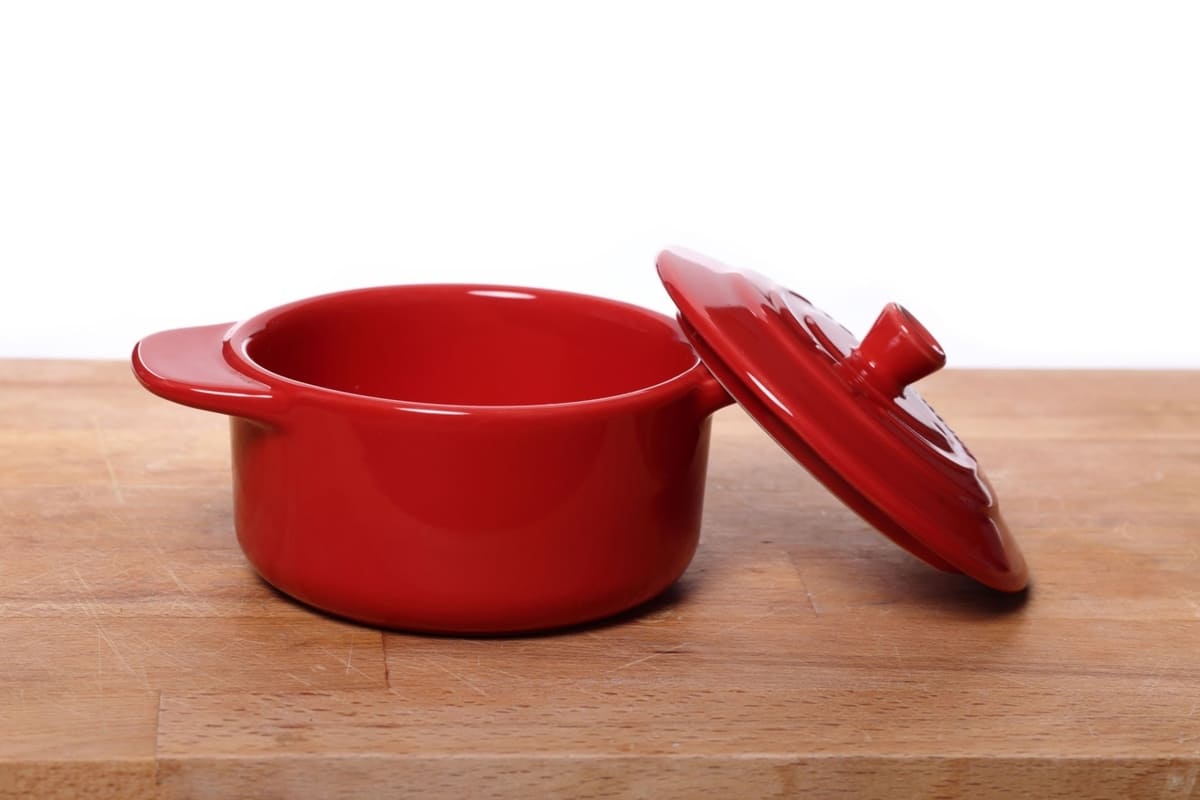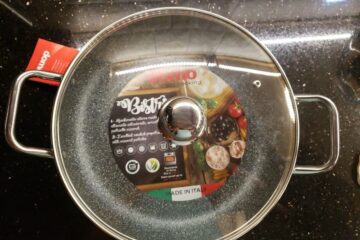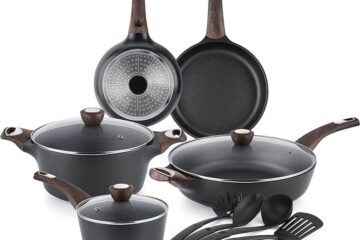Ceramic cookware has become a popular choice among home cooks and professional chefs alike. It is known for being lightweight, non-toxic, and attractive. However, one question that often comes up is how long does ceramic cookware last?
According to various sources, the lifespan of ceramic cookware can vary depending on factors such as quality, usage, and maintenance. On average, ceramic cookware can last up to three years when well taken care of. However, some high-quality ceramics can last for up to 30 to 50 years, which is almost double the lifespan of everyday cookware.
It is important to note that the non-stick coating on ceramic cookware can wear off over time, which can affect its effectiveness. This is why proper care and maintenance are crucial to prolonging the lifespan of ceramic cookware. In this article, we will delve deeper into the factors that affect the lifespan of ceramic cookware and provide useful tips on how to care for it.
What is Ceramic Cookware?
Ceramic cookware is a type of non-stick cookware that is made from clay and other natural materials. It is popular among home cooks and professional chefs due to its many benefits, such as its non-toxic and non-reactive properties.
Ceramic cookware is known for its even heat distribution, which allows for precise cooking and prevents hot spots. It is also lightweight and easy to handle, making it a great choice for those who suffer from arthritis or other hand-related issues.
One of the main advantages of ceramic cookware is that it is non-toxic. Unlike traditional non-stick cookware, which can release harmful chemicals into the air and food when heated, ceramic cookware is free from PFOA and other toxic chemicals. This makes it a safer and healthier option for cooking.
Ceramic cookware is also non-reactive, meaning that it will not react with acidic foods like tomatoes or citrus fruits. This helps to preserve the flavor and quality of your food.
Factors Affecting the Lifespan of Ceramic Cookware
When it comes to ceramic cookware, the lifespan can vary depending on several factors. Here are some of the factors that can affect the lifespan of ceramic cookware:
Quality of Ceramic Coating
The quality of the ceramic coating is one of the most significant factors that affect the lifespan of ceramic cookware. High-quality ceramic cookware can last for up to 3 years when well taken care of, while average ceramic cookware may need to be thrown out after a year. The reason for this is that the nonstick coating on the ceramic cookware can wear off over time, making it less effective and more difficult to clean.
Frequency of Use
The frequency of use is another factor that can affect the lifespan of ceramic cookware. If you use your ceramic cookware every day, it will wear out faster than if you only use it once a week. Overuse can cause the nonstick coating to wear off more quickly, leading to a shorter lifespan.
Cooking Methods
The cooking methods used with ceramic cookware can also affect its lifespan. High-heat cooking methods, such as searing or broiling, can cause the ceramic coating to break down more quickly. On the other hand, low-heat cooking methods, such as simmering or sautéing, can help prolong the lifespan of ceramic cookware.
Cleaning and Maintenance
Proper cleaning and maintenance are crucial for extending the lifespan of ceramic cookware. Using abrasive cleaners or scrubbing too hard can damage the ceramic coating, making it less effective and more likely to wear off. It is recommended to hand wash ceramic cookware using mild soap and a soft sponge. Avoid using metal utensils on ceramic cookware as they can scratch the surface and cause damage.
Signs of Wear and Tear
Ceramic cookware is known for its durability, but it is not indestructible. Over time, it can show signs of wear and tear that indicate it may need to be replaced. Here are some common signs to look out for:
- Non-stick coating wearing off: Ceramic cookware is coated with a non-stick surface that can wear off over time. When the non-stick coating starts to wear off, food may start to stick to the surface, making it harder to clean and reducing the effectiveness of the cookware.
- Scratches and chips: Ceramic cookware can be scratched or chipped if it is not handled carefully. Scratches and chips can damage the non-stick coating, making it less effective and reducing the lifespan of the cookware.
- Fading color: The color of ceramic cookware can fade over time, especially if it is exposed to high heat or harsh detergents. Fading color can be a sign that the cookware is starting to break down and may need to be replaced.
- Warped or dented surface: Ceramic cookware can become warped or dented if it is dropped or exposed to high heat. A warped or dented surface can affect the cooking performance of the cookware and may indicate that it needs to be replaced.
- Difficulty cleaning: Ceramic cookware should be easy to clean, but if it becomes more difficult to clean over time, it may be a sign that the non-stick coating is wearing off or that the cookware is becoming damaged.
It is important to note that not all signs of wear and tear mean that the cookware needs to be replaced immediately. However, if multiple signs are present or if the cookware is showing significant wear and tear, it may be time to consider replacing it.
How to Extend the Lifespan of Ceramic Cookware?
Ceramic cookware is a popular choice for many households due to its non-toxic and lightweight properties. However, like any product, it has a limited lifespan. With proper use and care, ceramic cookware can last up to three years. Here are some tips to extend the lifespan of your ceramic cookware:
Proper Use and Care
- Avoid using metal utensils as they can scratch or damage the coating. Instead, use wooden or nylon utensils.
- Do not place hot cookware directly into cold water. This can cause the ceramic to crack or chip. Always allow cooked food to cool slightly before washing.
- Use a gentle dish soap and a soft sponge to clean the cookware. Avoid using abrasive cleaners or steel wool.
- Do not stack ceramic cookware as it can cause scratches and chips.
Avoiding Common Mistakes
- Do not use high heat when cooking with ceramic cookware. Ceramic can withstand extreme temperatures, but sudden and significant temperature changes can reduce their lifespan.
- Do not use ceramic cookware in the oven at temperatures above 350°F.
- Do not use ceramic cookware on an induction cooktop unless it is specifically labeled as induction-compatible.
When to Replace Ceramic Cookware?
- If you notice scratches or chips on the surface of your pan, it’s time to replace it. These imperfections can harbor bacteria, and the ceramic coating can flake off into your food, making it unsafe to use.
- If the non-stick coating is wearing off, it’s time to replace your ceramic cookware. The non-stick coating is what makes ceramic cookware so popular, and once it starts to wear off, it can be challenging to cook with.
- If your ceramic cookware is more than three years old, it’s time to replace it. Even with proper use and care, ceramic cookware has a limited lifespan.
Conclusion
In conclusion, the lifespan of ceramic cookware can vary greatly depending on several factors like usage, maintenance, and quality. While some sources claim that ceramic cookware can last up to 50 years, others suggest that it may only last for a year or two.
It is important to note that the non-stick coating on ceramic cookware is often the first thing to degrade, leading to food sticking and potentially harmful chemicals leaching into food. Therefore, it is crucial to follow proper care and maintenance guidelines to extend the lifespan of ceramic cookware.
Here are some tips to help you get the most out of your ceramic cookware:
- Avoid using metal utensils that can scratch the surface and damage the non-stick coating.
- Clean your ceramic cookware regularly with gentle dish soap and a soft sponge or cloth.
- Avoid using high heat settings that can cause the non-stick coating to break down faster.
- Do not put your ceramic cookware in the dishwasher, as this can damage the surface and degrade the non-stick coating.
- Consider investing in high-quality ceramic cookware with a thicker, more durable non-stick coating for longer-lasting performance.
Overall, ceramic cookware can be a great addition to any kitchen when properly cared for and maintained. By following these tips and taking care of your ceramic cookware, you can enjoy delicious, healthy meals for years to come.



